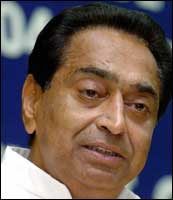Home > Business > PTI > Report
India keen to double global trade pie
August 31, 2004 12:48 IST
Last Updated: August 31, 2004 14:27 IST
 In a bid to double India's share in the global trade in the next five years, the government on Tuesday unveiled a comprehensive Foreign Trade Policy that focusses on stepping up employment-generating agriculture and services exports.
In a bid to double India's share in the global trade in the next five years, the government on Tuesday unveiled a comprehensive Foreign Trade Policy that focusses on stepping up employment-generating agriculture and services exports.
The five-year National Foreign Trade Policy announced by Commerce Minister Kamal Nath allows duty-free imports of capital goods in agriculture and consumables for metals other than gold and platinum, for promoting gems and jewellery exports.
Apart from setting up a new Handicraft Special Economic Zone, the policy provides for setting up bio-technology parks and an export promotion council for giving major thrust to service exports.
While merchandise exports account for nearly $70 billion annually, the services exports get an additional $50 billion at present.
The merchandise exports are expected to be doubled to $150 billion annually by 2009, and the services exports, growing rapidly, are also expected to touch the figure of $150 billion by the end of this decade.
Kamal Nath said the government will constitute a Board of Trade for boosting India's share in the world trade to $150 billion annually by 2009.
The board will be headed by an eminent person and not a minister, he said.
Apart from announcing a new scheme 'Vishesh Krishi Upaj Yojana' to boost agriculture exports, the policy exempts all goods and services exported from service tax.
It also exempts export-oriented units from service tax and all exporters with a minimum turnover of Rs 5 crore (Rs 5 million) from bank guarantee requirement.
The policy lays out a number of major procedural simplification and rationalisation measures.
A new scheme to establish free trade and warehousing zones has also been introduced to make India a global trading hub.
Hundred per cent FDI would be permitted for developing the zones and their infrastructure facilities.
Each zone would have a minimum outlay of Rs 100 crore (Rs 1 billion) and units there would qualify for all other benefits as applicable to special economic zones.
Kamal Nath said the Vishesh Krishi Upaj Yojana would boost exports of flowers, fruits, vegetables, minor forest produce and value-added products.
Such exports would qualify for duty-free credit entitlement equal to 5 per cent of FOB value of exports.
The capital goods import under EPCG for agriculture would be duty-free.
A new scheme 'Target Plus' has been introduced under which exporters who achieve quantum growth would be entitled to duty-free credit based on incremental exports substantially higher than the general annual export target.
For incremental growth of over 20, 25 and 100 per cent, the duty-free credit would be 5, 10 and 15 per cent respectively of FOB value.
Kamal Nath said the popular export incentive scheme Duty Entitlement Pass Book (DEPB) would be continued till it is replaced by a new scheme which will be drawn up in consultation with the exporters.
Apart from setting up the export promotion council, Kamal Nath announced two other major initiatives to boost services exports.
The government would promote establishment of common facility centres for home-based service providers.
Special focus initiatives have been prepared for sectors like handicrafts, handloom, gems and jewellery and leather and footwear.
For handicraft and handloom sector, Nath announced an increase in the duty-free import of trimmings and embellishments to 5 per cent of FOB value of exports which would also be exempt from countervailing duty.
The policy also authorised Handicraft Export Promotion Council to import trimmings and embellishment samples for small manufacturers who are unable to do so on their own. It also announced setting up of a handicraft special economic zone.
The threshold limit of designated towns of export excellence has been reduced to Rs 250 crore (Rs 2.50 billion) from Rs 1,000 crore (Rs 10 billion) in the special focus sectors.
Bio-technology parks will be established with facilities as provided to 100 per cent export-oriented units.
Announcing a new scheme of categorisation of status holders as 'Star Export Houses', Kamal Nath said they would be designated as one- to five-star depending on their total exports during the current and the previous three years.
The entry level for qualifying for this is Rs 15 crore (Rs 150 million) in three years, he said, adding, "We are confident that this will bestow status on a large number of hitherto unrecognised small exporters."
In a bid to simplify procedures and reduce transaction costs, Nath announced several measures, including increasing the validity of all licences and entitlements issued under various schemes for uniform 24 months.
He said the number of returns and forms to be filled has been reduced besides allowing import of secondhand capital goods without any age restriction.
He delegated powers to zonal and regional offices of DGFT to speed up the disposal and time-bound introduction of electronic data interchange with 75 per cent of export transactions on EDI within six months.
A new mechanism for speedy redressal of grievances of trade and industry has also been put in place.
Nath said Board of Trade would be revamped and given a 'clear and dynamic role.'